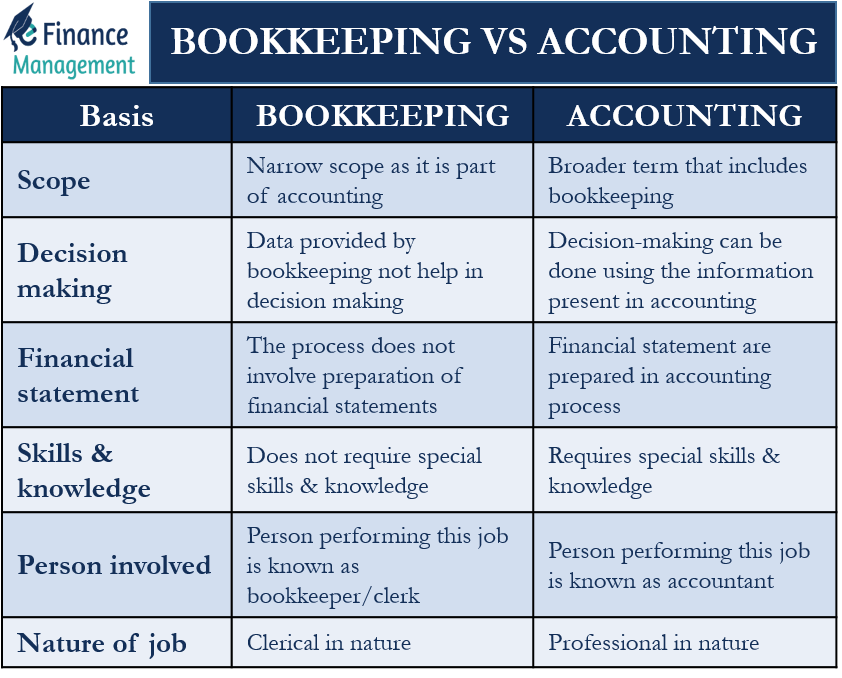In the financial world, the often-repeated most commonly used words are bookkeeping and accounting. These terms are though very common but are of utmost importance in the financial stream. In an accounting cycle, we could see that every transaction goes through a process of identifying, recording, classifying, summarising, analyzing, interpreting, and communicating all the monetary transactions. Bookkeeping deals with identifying and recording all such transactions as and when it happens usually. Whereas the rest of the functions and processes are done as part of accounting. So, now as we have a basic understanding of both terms, let us see Bookkeeping vs Accounting in detail.
Bookkeeping
Bookkeeping is simple to understand. As mentioned above, it is a systematic process of identifying and recording financial transactions in the books of accounts. Certainly, it helps the business to record the day-to-day transactions in chronological order for easy accessibility and understanding. It also serves as a base for preparing financial statements. So bookkeeping process is at the entry level and has a limited scope till the recording.
Accounting
Accounting, on the other hand, is the next level of bookkeeping. It is a systematic process of recording, classifying, analyzing, interpreting, summarizing, and communicating the entire financial transaction. It is a vast term as it includes bookkeeping, or we can say that bookkeeping is a part of the overall accounting process. Moreover, it helps in determining the financial status and strength of the business. Because it includes analysis and interpretation, besides recording. And this process is crucial for every business. Further, it requires special skills and knowledge.
Differences: Bookkeeping Vs Accounting
| Basis | Bookkeeping | Accounting |
|---|---|---|
| Scope | It has a narrow scope as it is a part of accounting and limits up to the recording of the transactions. | It is a broader term that includes bookkeeping as well. |
| Decision making | Data provided by bookkeeping does not help in decision-making. | Decision-making can be done using the information present in accounting (i.e., financial statements.) |
| Financial statement | The process of bookkeeping does not involve the preparation of financial statements; instead, it provides data for the preparation of the financial statement. | Financial statements are prepared in the accounting process using the information provided through the process of bookkeeping. |
| Skills & knowledge | Does not require special skills & knowledge. Anyone with basic knowledge can perform it. | It does require special skills and knowledge. |
| Person involved | The person performing this job is known as a bookkeeper or clerk. | The person performing this job is known as an accountant. |
| Nature of job | It is clerical. | It is professional. |

Bookkeeper Vs. Accountant
| Basis | Bookkeeper | Accountant |
|---|---|---|
| Task performed | The bookkeeper manages the day-to-day tasks of recording activity, posting in a journal, and maintaining the accounts. | An accountant verifies and analyzes the transaction, summarizes and classifies, interprets, and then communicates the relevant information to the concerned stakeholders. |
| Qualification requirement | Does not require any specific qualification; basic knowledge is enough. | Requires some professional qualification or degrees in the field of accounting and finance. |
| Paying Range | It depends on the size of the business. But the person is paid less than what an accountant receives. | Again it depends on the size of the business, but these people are paid a higher salary than the bookkeepers. |
| Complexity | The work of a bookkeeper does not involve much complexity as he just records day-to-day transactions and maintains accounts. | Accountants’ work is a bit complicated as it involves a lot of analysis. |
Conclusion
Both bookkeeping and accounting are interrelated. Accounting needs to rely on bookkeeping as it provides basic information for carrying accounting process. Moreover, accounting activity can only start when the bookkeeping work is over. Bookkeeping is a narrow concept and is a part of accounting. On the other hand, accounting is of much more importance to management as they rely on information from accounting rather than bookkeeping. So we can say that both of them have their importance in business but accounting is more important.


This article is good as it simplify between the bookkeeping and accounting. It is a great help for me to make as a reference.